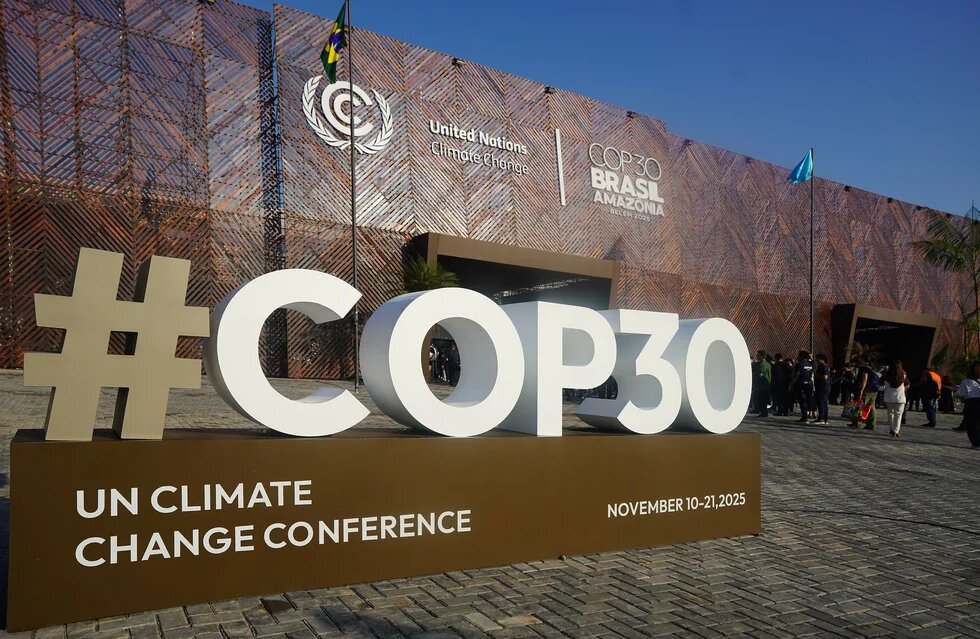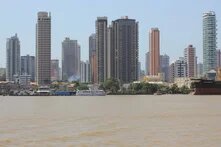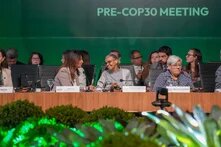With the start of COP30, Argentina finds itself on the sidelines of international climate diplomacy. The country is currently experiencing a severe dismantling of institutions and new dependence on extractivism – yet it was once a pioneer in climate protection.

Ten years after the adoption of the Paris Agreement, the world stands at a turning point. The COP30, held in Belém, Brazil, will not only revisit a decade of global climate governance but also takes place in a region where inequality, extractivism, and environmental degradation remain deeply intertwined with the political and economic order.
In this context, Argentina arrives at the COP30 immersed in a moment of environmental and institutional regression. The current government’s climate denialism, the dismantling of institutions and the weakening of international engagement contrast with the commitments assumed under the Paris Agreement. Over the past decade, Argentina moved from active participation in global climate governance to an unprecedented retreat. The current situation marks a turning point in the country’s external and environmental policy. In this context, COP30 becomes a moment to assess the depth of that retreat, and to understand whether any path to reengagement remains open.
A Fragile Decade for Climate and Politics
When the Paris Agreement was signed in 2015, Argentina and much of Latin America were entering a phase of renewed multilateral engagement. Over the following years, several countries strengthened their institutional frameworks for climate governance, aligning them with the Sustainable Development Goals. Argentina, for its part, adopted the National Climate Change Law (No. 27.520) and advanced its first planning instruments, including the National Adaptation and Mitigation Plan and its Long-Term Strategy.
However, behind these milestones lay deeper tensions. Participation processes were often formal rather than substantive, and the country’s energy agenda continued to rely heavily on fossil fuels. The idea of a “just transition” remained distant from actual planning and investment.
Since 2023, the situation has worsened. A profound institutional dismantling has weakened Argentina’s environmental governance: budget cuts, the downgrading of key areas, and the disappearance of climate policy from the political discourse reflect a broader crisis of governance. The country’s withdrawal from international spaces and the erosion of environmental institutions mirrors a trend seen across parts of the Global South — where economic crises are used to justify deregulation and the expansion of the extractive frontier.
How can Latin American countries move away from extractivism and inequality to build just, democratic, and low-carbon societies?
The approval of the Incentive Regime for Large Investments (Régimen de Incentivo para Grandes Inversiones/RIGI), designed to attract large-scale mining and hydrocarbon projects, exemplifies this shift. Such measures prioritise short-term investments over long-term resilience and social justice. At the same time, they weaken public participation, access to information, and environmental oversight.
In this line, the elaboration of Argentina’s third Nationally Determined Contribution (NDC 3.0) in late 2025 further illustrates this dissonance. While the update fulfilled the country’s formal obligations under the Paris Agreements, it did so without meaningful participation, transparency and ambition.
This political and institutional vacuum raises a crucial question for Argentina and the region: how can Latin American countries move away from extractivism and inequality to build just, democratic, and low-carbon societies, especially at a time when denialism and institutional dismantling threaten to erase the very foundations of climate governance?
Seeing Territories as Political Spaces
In contrast with national setbacks, many Argentine territories continue to mobilize and innovate: Local governments, communities, youth, and academic institutions across Argentina have kept the climate and environmental agenda alive, often linking it to struggles for rights, health, and livelihoods. Yet these same territories are also at the frontline of the crisis. Extreme weather events are increasingly revealing the country’s vulnerability, as seen in Bahía Blanca in March 2025, when a devastating storm resulted in fatalities and economic losses. These impacts underscore not only the urgency of adaptation but also the uneven capacity across regions to respond and recover.
While several provinces are advancing Climate Change Response Plans in contrast to the national context, progress remains fragmented and often limited by short-term priorities or extractive pressures - many provincial governments simultaneously promote fossil fuel or mining expansion. Building a coherent and preventive climate agenda for Argentina, therefore, requires bridging these gaps, connecting climate action with biodiversity protection, human rights, and the defence of communities most exposed to loss and damage.
While several provinces are advancing Climate Change Response Plans in contrast to the national context, progress remains fragmented.
In practice, territorial action often goes beyond “climate policy.” It emerges from resistance to deforestation, the defence of water and land, and the search for fairer economic models. Communities in Patagonia, Cuyo, and the North of Argentina are challenging fossil fuel and mining projects that threaten ecosystems and local economies. These conflicts reveal that environmental debates are not just about emissions or adaptation targets, they are about power, territory, and the right to decide how development should look.
Across Latin America, similar tensions unfold. The Amazon Basin, the Gran Chaco, and the Andean highlands concentrate both ecological wealth and socio-environmental conflicts. Belém, located at the heart of the Amazon, will host the COP in a region that symbolizes both hope and contradiction: it embodies the world’s largest carbon sink and one of the most contested frontiers of extraction.
Recognizing territories as political spaces, not merely as sites of environmental management, is essential for understanding the challenges of implementing global commitments in deeply unequal societies.
Belém and the Meaning of a Latin American COP
The return of the climate summit to Latin America after nearly a decade carries symbolic weight. COP30 could become an opportunity to bring regional realities and priorities to the global stage, adaptation, loss and damage, and just transition, or it could repeat the pattern of lofty declarations disconnected from local realities.
For Latin American countries, the challenge is to translate global narratives into policies that address their own inequalities. A just transition cannot be reduced to technological substitution or carbon accounting; it must also confront the social and economic structures that reproduce vulnerability and exclusion.
The growing global demand for “transition minerals” such as lithium and copper reaffirms existing power asymmetries - both between North and South and within the territories themselves. Without robust governance and participation, the transition risks reproducing old patterns of dependency. Placing people and communities at the centre of the transition is therefore essential, ensuring that climate action contributes to reducing inequality and strengthening rights rather than deepening exclusion.
Latin America has a chance to show that climate policy can also be social policy, that resilience and democracy are built from the territories upward.
For Argentina, the outlook is complex and uncertain. The country arrives at this COP amid a sharp weakening of its environmental institutions, open expressions of climate scepticism within the national government, and a growing detachment from multilateral frameworks. Whether Argentina chooses to remain on the sidelines or to engage through other actors will largely determine how visible its contribution becomes. The absence of national climate leadership risks limiting the dynamism of those - provincial governments, academic institutions, and civil society networks - who, despite shrinking resources and institutional support, continue to sustain parts of the climate agenda.
In Belém, debates around adaptation and just transition will resonate strongly. For Argentina, this means not only aligning its commitments with social justice and ecological integrity, but also rebuilding the institutional and participatory foundations needed to implement them. A credible and ambitious climate policy cannot exist without people at its centre.
Latin America has a chance to show that climate policy can also be social policy, that resilience and democracy are built from the territories upward. But for that to happen, the COP in Belém must amplify the voices of local actors, indigenous peoples, and civil society networks that continue to defend their territories amid shrinking civic space and political disillusionment.
The political meaning of this COP will not be measured only by new targets or pledges but by whether it helps rebuild trust and multilateralism in a region where both are increasingly fragile.
A Continent Staggers Between Fragmentation and Possibility
Ten years after Paris, Argentina finds itself in a mirror that reflects much of Latin America’s complexity: fragile institutions, social resilience, and an urgent need for a renewed social pact around the environment. Yet the country’s reality also reveals specific challenges, a deeper institutional regression and an explicit form of climate denialism that distinguish it within the region. While Argentina shares with its neighbours the structural tensions of extractivism and inequality, the erosion of its environmental governance in recent years exposes how quickly political and institutional backsliding can undermine global commitments.
The decade ahead will test whether Latin America can move beyond extractivism and rebuild governance frameworks that integrate ecology, democracy, and equity. COP30, held in the world’s largest rainforest, reminds us that climate action is not only about carbon. It is about the political decisions that shape our territories and our future.
For Argentina and the region, the real question is not whether to act on climate change, but what kind of transformation they are willing to pursue, and for whom.

